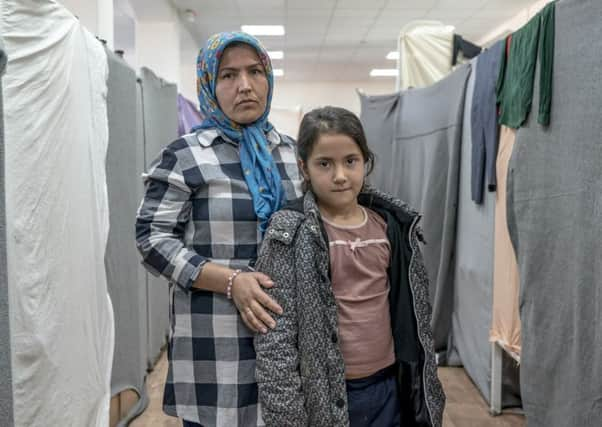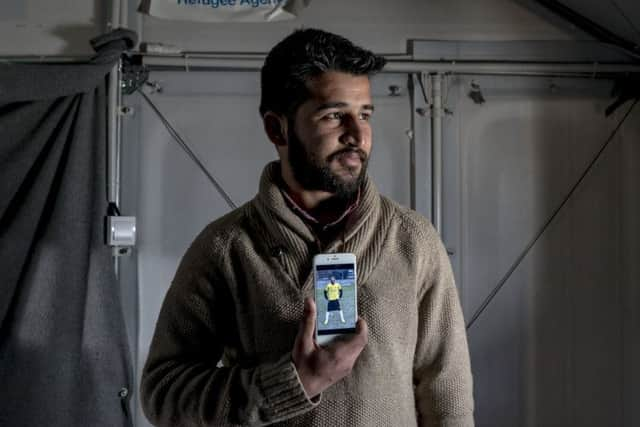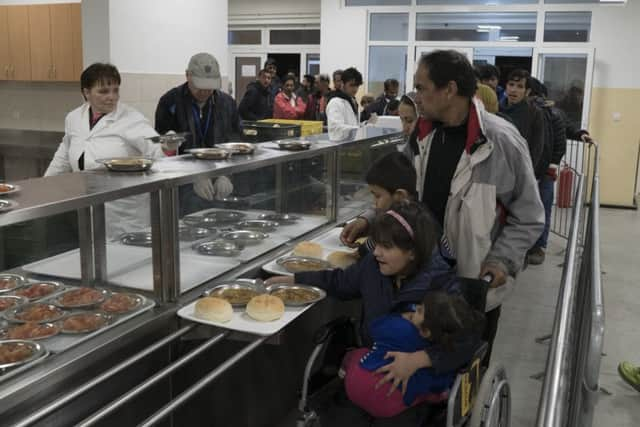Jane Bradley: Closing borders tears refugee families apart


“I am missing her so much,” she says. “I miss all of them, but her particularly.”
The 33-year-old mother of four has not seen her husband or three older children for more than a year after the Serbian border with Hungary was closed, leaving her and her youngest daughter, Zahara on one side – and the rest of her family on the other. She is trapped in Serbia in the camp at Presevo on the Kosovo border.
Advertisement
Hide AdAdvertisement
Hide AdThe Husseins decided to flee their home in Afghanistan’s Bamyan Province in early 2016 and paid people smugglers thousands of pounds to get them to Serbia. But days before they were due to leave, Hussein, 33, began to experience severe pain from a leg injury sustained in an accident years ago.


The family decided that she would stay behind with Zahara, seven, until her leg improved – and her husband and older children would begin their journey without them.
Travelling as a lone woman was not easy. “It is very difficult to come all this way without a man alongside you,” she says.
Hussein recalls numerous times when she felt like giving up on the journey. “We were on a dinghy. I held my daughter’s hand and said to her: ‘If we stay alive, we will be alive together and if we die, we will die together.”
But the most difficult time came when she was forced to endure a 40-hour journey on foot as she and Zahara crossed the Bulgarian mountains.


Zahara, exhausted, was struggling to continue and they begged one of the smugglers to let them take a break. “He said: ‘I don’t care about you and if you don’t want to walk, you can stay here on this mountain,’,” recalls Hussein. “Zahara was falling unconscious and I was having to carry her.
“But there were times she used to tell me to have patience, that we would reach our destination. If it wasn’t for her, I wouldn’t be here right now.”
During the journey in March last year, she heard the good news that her family had got to Austria and were living in a camp there.
Advertisement
Hide AdAdvertisement
Hide AdBut Hussein and her daughter reached Europe just a few days too late: the political situation had changed and the border with Hungary had been closed just a week earlier. She was unable to cross.


She has since been trapped in Serbia, living in a refugee camp indefinitely and has no idea when she will see her family again. She has contacted the Red Cross and the United Nations’s refugee arm, UNHCR, for help, but the process is slow.
Now, she and her daughter are both suffering from mental health problems as a result of their ordeal. Zahara is waking, screaming, at night and her behavioural problems have forced her mother to consider the ultimate sacrifice.
“I have talked to UNHCR to take care of her custody. I can’t look after her properly any more,” she says.
The camp at Presevo where Hussein lives houses families as well as single young men, its residents numbering more than 800. Most now are from Afghanistan, Iraq, Iran and Pakistan. The vast majority of Syrians, fleeing the civil war in their home country, passed through before the borders – and with them, the route to western Europe – closed a year ago.


The sun has come out in Presevo – marking the beginning of spring – and a group of men are playing volleyball on a court in the main yard.
Muhammad Adnan Khan, 24, a former professional footballer in Pakistan, has been in the camp for seven months and plans to claim asylum in Serbia.
He believes his father had become embroiled with the local Taleban, an involvement he hid from his young family.
Advertisement
Hide AdAdvertisement
Hide Ad“I don’t know exactly which group my father was in,” he says. “But he didn’t want to tell us about these things. When I was in the high school, he mentioned: ‘This is my advice: never get involved in these groups,’. I realise now that he was stuck there.”
But it was when his father died that things changed and Taleban fighters tried to recruit Khan and his siblings.
“We don’t know how he died,” he says. “My mother gave the Taleban money for my two brothers. But when it came to me, they said ‘We don’t need money, we need him.’ Because I spoke other languages, I was useful to them. They said ‘If he doesn’t come, we will kill him.’”
He hopes that one day, he will be able to return to Pakistan, but until then, he plans to settle in Serbia.
“I came here and saw it was safe, so I don’t want to go to other countries. The people are so nice.”
He indicates the outside world of the predominantly Albanian town of Presevo, where a mosque stands just metres from the gates of the camp.
Residents are allowed to apply for a pass to visit the town with permission from the camp commissariat, but numbers are restricted.
“For me, the worst thing is that there is a mosque right there,” he says. “I want to pray five times a day, but I can’t get there.”
Advertisement
Hide AdAdvertisement
Hide AdHowever, Khan’s plans to stay in Serbia are unusual. The country has an unemployment rate of around 13 per cent, and is seen as economically unable to sustain a large immigrant population.
Germany is the favoured destination. Chancellor Angela Merkel’s open door policy – which has seen the country take in more than a million refugees since the crisis began in 2015 – means many asylum seekers already have friends or family living in the country.
Just 1,803 refugees of around 7,400 currently living in Serbia, have claimed asylum in the country this year, according to the UNHCR. The figure, however, suggests the trend is increasing – with just 2,484 having done so in the whole of 2016.
Dragana Levicanin, project coordinator at Serbian charity Philanthropy, says: “We have to be realistic. It is a poor country. Many of the younger people want to go to university and get good jobs and they know that may not be possible here.”
Yet all of the refugees are very positive about the reception they have received from Serbians, who were embroiled in their own civil war at the turn of this century.
“[The war in former Yugoslavia] is why it is easy for people to understand refugees when they come here,” explains Philanthropy’s director, Dragan Makojevic. “They are almost my family – we can see them, we recognise them. This is why there have not been protests, demonstrations and the like.”